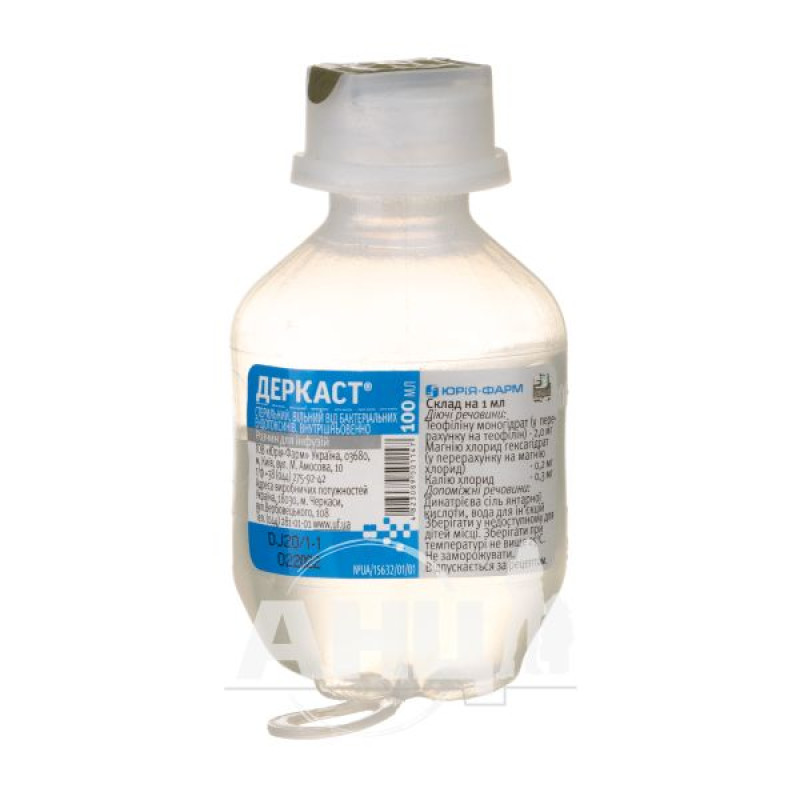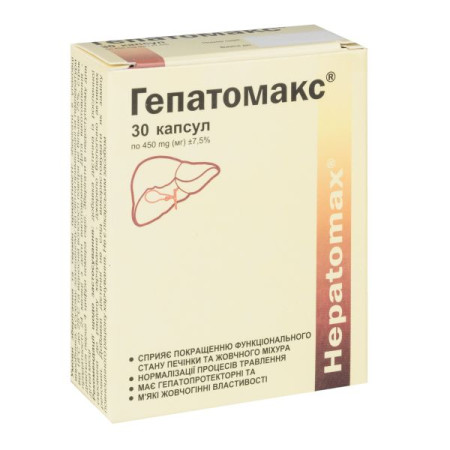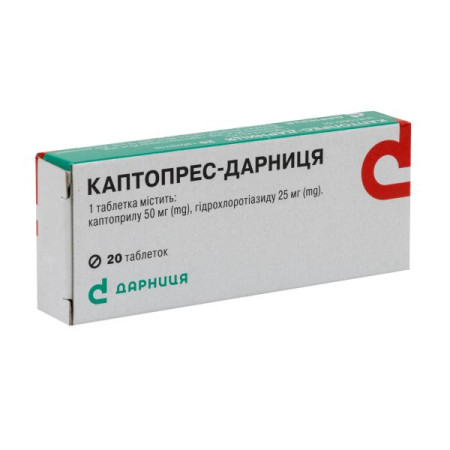Derkast solution for infusions polymer container 100 ml

Derkast infusion solution is indicated for bronchoobstructive syndrome in bronchial asthma, bronchitis, pulmonary emphysema, disorders of the respiratory center (nocturnal paroxysmal apnea), "pulmonary heart".
Composition
Active ingredients: 1 ml of solution contains:
theophylline monohydrate (in terms of theophylline) - 2 mg; potassium chloride - 0.3 mg; magnesium chloride hexahydrate (in terms of magnesium chloride) - 0.2 mg.Excipients: disodium succinic acid, water for injections.
Contraindication
Hypersensitivity to the components of the drug, as well as to other xanthine derivatives (caffeine, pentoxifylline, theobromine), acute heart failure, angina pectoris, acute myocardial infarction, decompensated chronic heart failure, paroxysmal tachycardia, extrasystole, AV conduction disorders, severe arterial hyper- and hypotension, widespread atherosclerosis of vessels, pulmonary edema, hemorrhagic stroke, retinal hemorrhage, glaucoma, history of bleeding, gastric ulcer (in the acute stage), gastroesophageal reflux, epilepsy, increased convulsive readiness, uncontrolled hypothyroidism, hyperthyroidism, thyrotoxicosis, severe hepatic and/or renal failure, porphyria, sepsis, acidosis, hyperkalemia of various genesis, hyperchloremia, acute dehydration, significant burns, intestinal obstruction, Addison's disease, age patient >70 years. Children (up to 18 years). Pregnancy and breastfeeding.
Method of application
The drug should be administered following the rules of administration technique. The dose should be selected individually, taking into account the possibility of different elimination rates.
If the patient is taking oral theophylline, the dose of parenteral theophylline should be reduced.
When administering the drug, the patient is in a supine position; the doctor monitors blood pressure, heart rate, respiratory rate, and the patient's general condition.
Application features
Pregnant women
Contraindicated.
Children
The drug should not be used in children (under 18 years of age).
Drivers
During the period of use of the drug, you should refrain from driving vehicles and performing other work that requires concentration.
Overdose
With rapid administration, convulsions, arrhythmias, severe hypotension, angina pectoris, apathy, weight loss, mental disorders, and ECG changes are possible.
Side effects
From the central and peripheral nervous system: agitation, anxiety, restlessness, anxiety, sleep disturbances, insomnia (especially in children), headache, dizziness, tremor, irritability, convulsions, hallucinations, delirium, epileptiform seizures, confusion/loss of consciousness, presyncopal state. From the cardiovascular system: palpitations, cardialgia, arrhythmias, tachycardia, extrasystole, decreased blood pressure, heart failure, increased frequency of angina attacks, collapse (with rapid administration), shock. From the urinary system: increased diuresis (due to increased glomerular filtration), in elderly patients - difficulty urinating (due to relaxation of the detrusor). On the part of the immune system: allergic reactions, including rash, urticaria, itching, angioedema, exfoliative dermatitis, anaphylactic shock, bronchospasm. On the part of the gastrointestinal tract: stimulation of gastric juice secretion, stomach pain, decreased appetite, diarrhea, intestinal atony, gastroesophageal reflux, heartburn, exacerbation of peptic ulcer, nausea, vomiting.Interaction
During treatment, you should not consume alcoholic beverages, large amounts of food and drinks containing methylxanthines (coffee, tea, cocoa, chocolate, Coca-Cola), drugs related to theophylline (caffeine, theobromine, pentoxifylline), because these substances can enhance the stimulating effect of theophylline on the central nervous system.
The combination of theophylline and fluvoxamine should be avoided. If this combination cannot be avoided, patients should take half the dose of theophylline and closely monitor plasma concentrations of the latter.
The concomitant use of theophylline with herbal preparations containing St. John's wort (Hypericum perforatum) should be avoided.
Storage conditions
Store at a temperature not exceeding 25 °C. Do not freeze.
Keep out of reach of children.
Shelf life - 2 years.
There are no reviews for this product.
There are no reviews for this product, be the first to leave your review.
No questions about this product, be the first and ask your question.










